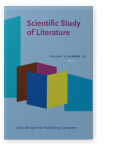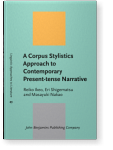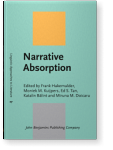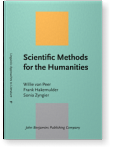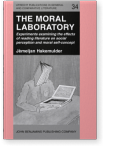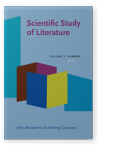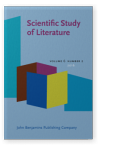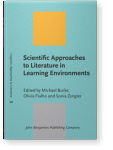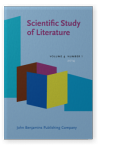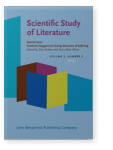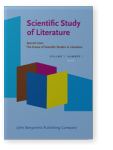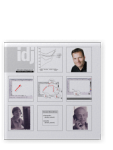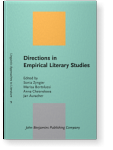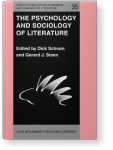Frank Hakemulder
List of John Benjamins publications for which Frank Hakemulder plays a role.
Journal
Book series
Titles
Narrative Absorption
Edited by Frank Hakemulder, Moniek M. Kuijpers, Ed S. Tan, Katalin Bálint and Miruna M. Doicaru
[Linguistic Approaches to Literature, 27] 2017. ix, 319 pp.
Subjects Communication Studies | Discourse studies | Narrative Studies | Pragmatics | Theoretical literature & literary studies | Writing and literacy
Scientific Methods for the Humanities
Willie van Peer, Frank Hakemulder and Sonia Zyngier
[Linguistic Approaches to Literature, 13] 2012. xxii, 328 pp.
Subjects Theoretical literature & literary studies
The Moral Laboratory: Experiments examining the effects of reading literature on social perception and moral self-concept
Frank Hakemulder
[Utrecht Publications in General and Comparative Literature, 34] 2000. x, 205 pp.
Subjects Consciousness research | Philosophy | Theoretical literature & literary studies
2017 Effects of exposure to literary narrative fiction: From book smart to street smart? Scientific Study of Literature 7:1, pp. 129–169 | Article
Literary narrative fiction may be particularly effective in enhancing Theory of Mind (ToM), as it requires readers to contemplate author and character intentions in filling the literary ‘gaps’ that have been suggested to characterise this fiction type. The current study investigates direct and… read more
2017 Narrative absorption: Introduction and overview Narrative Absorption, Hakemulder, Frank, Moniek M. Kuijpers, Ed S. Tan, Katalin Bálint and Miruna M. Doicaru (eds.), pp. 1–7 | Chapter
2017 Chapter 2. Towards a new understanding of absorbing reading experiences Narrative Absorption, Hakemulder, Frank, Moniek M. Kuijpers, Ed S. Tan, Katalin Bálint and Miruna M. Doicaru (eds.), pp. 29–47 | Chapter
When reading literary narratives, we assume that readers can get absorbed in the story world and in the story’s artifice. Since most absorption research focuses primarily on popular media, virtually no attention has been paid to the possibility that literary devices such as deviation could elicit… read more
2017 Chapter 5. Into film: Does absorption in a movie’s story world pose a paradox? Narrative Absorption, Hakemulder, Frank, Moniek M. Kuijpers, Ed S. Tan, Katalin Bálint and Miruna M. Doicaru (eds.), pp. 97–118 | Chapter
Most film viewers know the experience of being deeply absorbed in the story of a popular film. It seems that at such moments they lose awareness of watching a movie. And yet it is highly unlikely that they completely ignore the fact that they watch a narrative and technological construction.… read more
2016 Reconceptualizing foregrounding: Identifying response strategies to deviation in absorbing narratives Scientific Study of Literature 6:2, pp. 176–207 | Article
The experience of deviation is often referred to as foregrounding and contrasted with the experience of feeling absorbed in a narrative. However, instead of simply assuming that foregrounding and absorption are mutually exclusive, they should also be considered as co-occurring: being absorbed as a… read more
2016 Chapter 2. Learning from literature: Empirical research on readers in schools and at the workplace Scientific Approaches to Literature in Learning Environments, Burke, Michael, Olivia Fialho and Sonia Zyngier (eds.), pp. 19–38 | Article
This chapter explores what learning from literature entails and how we can come to insights about what literature can mean in the lives of readers, what they may discover about themselves and others. Reading literary stories leads to higher scores on standardized tests for social skills (e.g.,… read more
2016 Literary reading and critical thinking: Measuring students’ critical literary understanding in secondary education Scientific Study of Literature 6:2, pp. 243–277 | Article
Previous research suggests that literary reading may involve critical thinking. This involvement may facilitate critical literary understanding (CLU), i.e. understanding the literary text in a reconstructive, de-automatized manner. However, little is known about the cognitive processes this… read more
2013 The scope of SSOL: A discussion of the boundaries of science and literature Aesthetic Engagement During Moments of Suffering, Kuiken, Don and Mary Beth Oliver (eds.), pp. 169–174 | Article
2011 Ways to engage readers: Relevance in the scientific study of literature The Future of Scientific Studies in Literature, pp. 144–152 | Article
There must be more to reading than just text comprehension — stories are to entertain, Brewer and Lichtenstein (1984) famously proclaimed. Hence, they said, research should focus more on how stories do that. What are the implications of this statement? Could that knowledge be of interest to people… read more
2008 Literary potential: The unexplored powers of reading Information Design Journal 16:2, pp. 126–132 | Article
2008 Imagining what could happen: Effects of taking the role of a character on social cognition Directions in Empirical Literary Studies: In honor of Willie van Peer, Zyngier, Sonia, Marisa Bortolussi, Anna Chesnokova and Jan Auracher (eds.), pp. 139–153 | Article
In a series of experiments, Hakemulder (2000) showed that identifying with a story character representing a particular outgroup affects readers’ beliefs about that outgroup. The present contribution describes theories concerning the uses of imagining ourselves in the shoes of story characters.… read more
2001 How to make alle Menschen Brüder: Literature in a multicultural and multiform society The Psychology and Sociology of Literature: In honor of Elrud Ibsch, Schram, Dick and Gerard J. Steen (eds.), pp. 225–242 | Article
